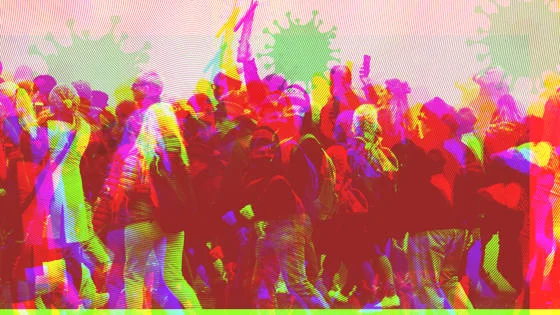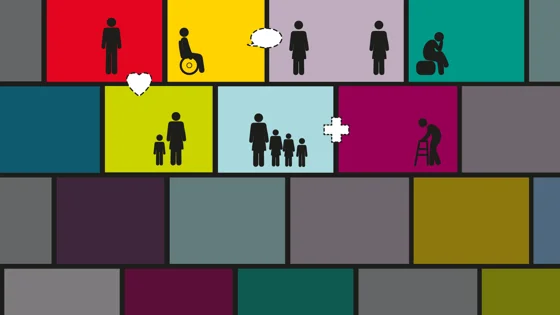Can we trust our leaders? Disinformation in the time of COVID

Contents
When Peter Pomerantsev published his latest book on disinformation, fake news was already a global issue. Then came coronavirus, throwing the world into crisis and bringing many of the issues reported in the book to the fore.
This is Not Propaganda is a deep dive into the age of disinformation. Touring Mexico, Ukraine and Brazil, it investigates the communications activities of states, dissidents and activists as they battle for influence in the information wars that shape our understanding of the world. When a new virus, COVID-19, began to take hold, the world faced a completely new threat, around which potentially any "truth" could be sewn.
Can we trust our leaders?
In the early stages of the pandemic, leaders such as Donald Trump and Boris Johnson overcame their early initial doubts about the threat the virus posed to work closely with scientific advisors. This represented a significant departure for two men who have regularly undermined experts and promoted falsehoods during their political careers.
These guys have no ideology. They are very good at pivoting and forgetting what they said yesterday.
"Leaders like Donald Trump and Boris Johnson’s eventual response to this grave crisis was guided by science and facts," Peter Pomerantsev said. "They stood alongside advisors who they might have previously disparaged, and recognised that people desperately needed facts for their survival."
While this was clearly a positive move, Peter Pomerantsev cautioned that this development was unlikely to lead to a long-term shift in these leaders’ modus operandi. "Their ability to take different positions on any political issue gives them more latitude to dissemble and row back on previous statements as the pandemic continues" he said. "Because these guys have no ideology. They are very good at pivoting and forgetting what they said yesterday, so they will just reinvent themselves again."
This is Not Propaganda is also a study of how disinformation circulated within a fragmented media landscape threatens our civic institutions. But one of the features of the pandemic has seen societies like the UK increase its reliance on established news sources, with surging audiences for public broadcasters such as the BBC and Channel Four.
To move forward, or return to partisan bias?
Looking towards the next phase of the management of the pandemic (at the time of this interview much of the world was still in lockdown) Peter Pomerantsev saw the next phase as being critical for how our relationship with the state and publicly funded news develops.
He said: "The question that will be interesting after this has passed is whether we continue to share our reality, as we have done during COVID-19, where we unite around commonly accepted sources of knowledge, or whether this sense of unity is this going to disappear into partisan bias.
"For politicians, this is a unique opportunity to continue to build trust with citizens around sources of knowledge after things return to normal."
After COVID, will we continue to share our reality, or will this sense of unity disappear?
Conspiracy theories and social media
While established media has become a vital resource again for many citizens, the coronavirus pandemic has also increased concerns that private messaging sites such as WhatsApp are now the leading disseminators of fake news and conspiracy theories.
Early warning signs about the power of private messaging groups came with violence against Muslims in India in 2019, where WhatsApp was found to have been used to spread false information.
In April 2020, WhatsApp introduced limits on the number of times a message can be forwarded, following suspected arson attacks against telecommunications infrastructure in the UK and reports that conspiracy theories linking the spread of COVID-19 5G masts were being spread on the site.
"Lots of people are spending more time on closed groups instead of public social media sites like Twitter and Facebook" Peter Pomerantsev said. "One of the problems with this is that WhatsApp is impossible to monitor."
Pomerantsev doubts that simply limiting the size of the messaging groups to under 200, as has been suggested, will solve the problem. "While this may slow the circulation of messages, several groups could still spread a message very quickly" he said.
"What to do about private chat services is the one question which I absolutely dread being asked at events now, because it cuts into really difficult philosophical questions around freedom of speech and censorship, or whether fact checking could have a role in private groups."
Holding truth to account
Arguments for censorship are countered by the fact that WhatsApp groups are relied on by dissident groups in authoritarian regimes to organise and hold their government to account. This type of pressure, Peter Pomerantsev argued, will be crucial in the aftermath of the pandemic when we are discussing how different governments managed.
However the current crisis unfolds, it has created the possibility of a reset when it comes to how we choose to engage with the information that is out there. We shouldn’t waste the opportunity to change, he stresses: "In so many areas of our lives, with the economy, transport, what we buy, we’re doing unthinkable things. The changes to how we use the media means this period can also change our relationship with information."
Peter Pomerantsev was speaking to Peter Carrol, Media Relations Officer at LSE.
Images: Newspapers by Artisteer/iStock; Smoke by robert-zunikoff-ebno-NwaOns/Unsplash.
Download a PDF version of this article





